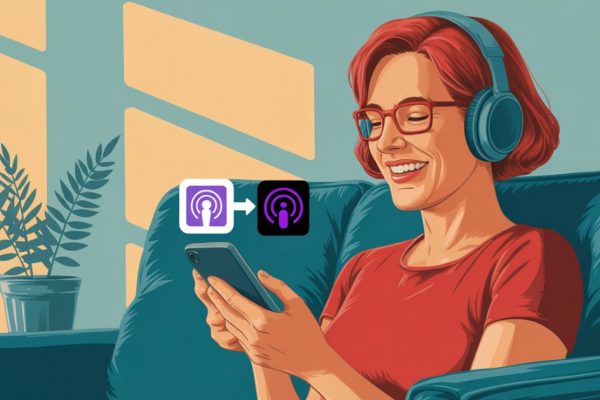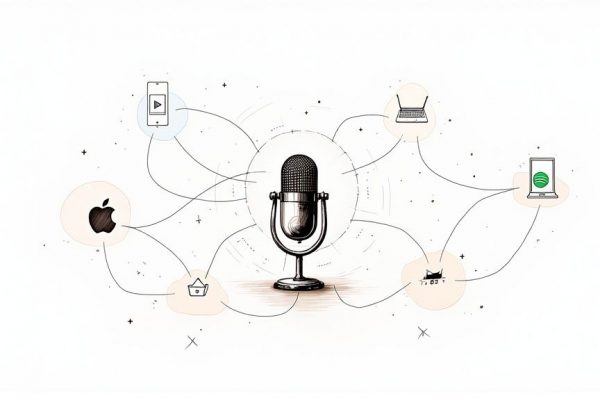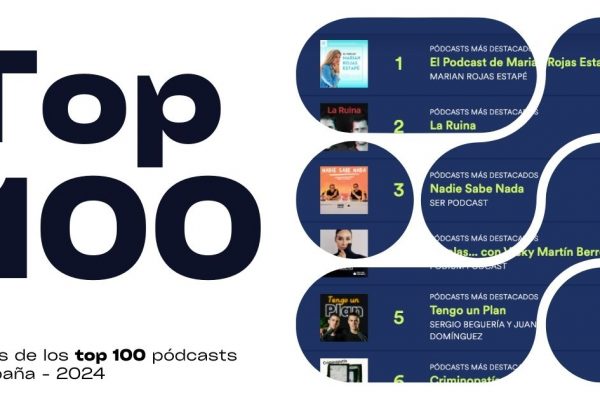Before answering this question — and let me tell you upfront that we don’t have a clear answer — a quick clarification:
The algorithms that determine which podcasts appear in the Apple and Spotify rankings, and in what position, are not public.
No one knows exactly what criteria they use.
That said, anyone who talks about this topic must do so based on personal experience. That’s exactly what we’ll do in this article.
But first, let’s clarify a few things…
What’s the purpose of the rankings?
The podcast rankings you can find on Spotify and Apple Podcasts are designed to favor and give visibility to strong new release.
It’s common to see new podcasts at the top of the charts because recent subscriptions carry significant weight in the algorithm.
For that same reason, the tricky part is staying in the rankings. Since recent subscriptions are heavily weighted, only those who consistently attract new subscribers can remain at the top.
This includes radio shows that have been turned into podcasts, as they use radio to promote their content, which brings them a constant flow of new subscribers.
That’s just how it is.

Is it really that relevant to be in the Apple and Spotify rankings?
Obviously, no one’s going to complain about a bit of extra visibility. It’s better to be in the Apple and Spotify rankings than not.
But the truth is… it’s not that important. It serves more to boost your ego than to bring in real listeners.
Think about this:
If being in the rankings actually led to a significant number of new listeners and subscribers, it would create a kind of vicious circle where the same few podcasts would always stay at the top.
Apple and Spotify don’t want that. They want movement, constant change, and they want to push new shows that can bring in fresh listeners.
Everything they do is aimed at attracting new users.
Content is king
The reality is that podcast listeners don’t usually check Apple oand Spotify rankings to discover new shows.
And if they do, it’s only a very small percentage.
The main way people discover podcasts is through word of mouth. That’s right — the oldest and most powerful distribution channel there is.
So… how can you get people talking about your podcast?
By keeping your listeners happy. By turning them into evangelists for your show. And the key factor for that is content: entertain, educate, bring value… Content is what will truly help you grow in a sustainable and organic way.
Plus, the algorithm (like all algorithms) is constantly evolving to make sure no one can figure out how to game it. So, something that might work today might be completely useless in the future.
What we do know about the algorithm comes from podcasters who’ve experimented with their own shows to find out which factors influence the rankings in a significant way.
First, you should know that these investigations suggest the following: Apple’s ranking algorithm is based on interactions — meaning the actions users take with your podcast within Apple or in places where Apple can track those actions (and this is important — we’ll explain why later).
Apple’s ranking algorithm is based on interactions
Even though some claim to know how it works, the Apple Podcasts ranking algorithm is a secret.
Each interaction gets a score, depending on what Apple wants to prioritize. To give you an idea: a subscription to your podcast counts more than someone simply visiting your podcast page on Apple Podcasts, just as an example.
Interactions, from least to most relevant, are:
- Generic interactions: sharing the podcast, visiting the podcast page on Apple Podcasts…
- Reviews your listeners leave on Apple Podcasts. Note: these have very little impact.
- Plays*
- Downloads*
- New subscriber: This is the big one — the interaction that carries the most weight in the algorithm. If you manage to get hundreds of new subscriptions in a short period of time, your chances of appearing in the rankings go way up.
* Downloads and plays must happen through Apple software or one of its services. Plays or downloads via third-party podcatchers like Pocket Casts or Overcast don’t count.
IMPORTANT: The score of interactions decreases over time. For example, if a listener subscribes today, that action might be worth 10 points. Tomorrow, the same listener will be worth 9 points, and the next day, 8. The algorithm recalculates the rankings several times a day to keep them dynamic.
How to climb the Apple and Spotify rankings
In the app world, there’s ASO (App Store Optimization). On Google, there’s SEO (Search Engine Optimization). And now, we might as well talk about PSO (Podcast Search Optimization — yeah, we just made that up).
But hey, you get the idea. The point is that with the little information we have, we should try to optimize our podcast to show up in Apple Podcast rankings and search results.
To do that, it’s worth reviewing the metadata you’ve added to your podcast and episodes:
- Categories: Apple lets you choose up to 3. Make sure you select the most relevant ones for your podcast topic.
- Cover art: Poor cover art may hurt your chances of appearing in the rankings. Apple cares a lot about design and visuals, so make sure your podcast cover looks good.
- Podcast title: Avoid using banned words (you could get censored in search), and ideally, don’t include the word “podcast” in the title. You want to stand out. If you include the word “podcast,” you’ll just get lost among all the others that do the same.
- Description: Clearly explain what your podcast offers, and try to include multiple keywords you’d like to be found with.
- Episode title: Keep it short so the whole thing shows up in listings, and try to put the main keyword at the beginning for better positioning.
- Show notes: These should be detailed and include various keyword variations. The algorithm reads this text, so it’s in your best interest to make it as optimized as possible. And don’t forget, other algorithms like Google’s also read them — so don’t slack off, and put some effort into writing good notes.

How to rank on Apple: recommendations
Don’t let the algorithm cloud your judgment… if you do everything we’ve mentioned in this article but your podcast content is bad, you’ll never climb the Apple Podcasts rankings. Never.
So, first and foremost, make sure your content is good — both from a technical standpoint (great audio quality) and a production standpoint (solid format, interesting topic, engaging delivery…).
It’s also important to promote your podcast well. If you don’t spread the word, no one else will. On top of that, here are a few extra recommendations that might help:
Use Apple’s embedded podcast player
As we mentioned earlier, Apple can measure interactions when they happen on its platform or via one of its services.
Well, Apple’s embedded podcast player is one of them. If you want to improve your ranking on Apple, it’s a good idea to use their player on your website instead of, say, Spotify’s.
Publish more than 3 episodes at launch
When you launch your podcast on Apple Podcasts, try to have 3 or more episodes available from day one.
This helps generate more interactions in a short time, because your fans will be able to download and listen to at least 3 episodes instead of just one. Plus, you’ll have 3 chances to ask them to subscribe and leave a review.
Apple Podcasts gives new shows an initial push in the rankings. If you take advantage of that momentum with extra interactions, you could climb all the way to the top.
Reviews
Lastly, let’s talk about reviews — the most repeated request from podcasters over the past decade: “Leave me a review, leave me a review…”
As we’ve already said, reviews aren’t the most heavily weighted interaction, but it still makes sense to ask for them.
Why? Because when listeners go to Apple Podcasts to leave a review, it’s likely they’ll also take other actions. Ta-da! So, by asking for reviews, you might end up with more plays, more downloads, and even some new subscribers — like that listener who’s been tuning in regularly but never hit the subscribe button.
Conclusion
While the exact workings of Apple and Spotify’s algorithms remain a mystery, what we do know points in one clear direction: focus on quality content and genuine engagement. Chasing the rankings might seem tempting, but the real long-term growth comes from building a loyal audience that loves what you do and shares it with others.
Optimize what you can — your metadata, your launch strategy, your promotion — but never lose sight of what matters most: creating a podcast worth listening to.
Put your listeners first, deliver value in every episode, and keep showing up. The rankings may follow — and even if they don’t, you’ll still be building something meaningful.
Let’s go make great audio.
About the author
Mumbler CEO & Cofounder. Slow content creator: newsletters, podcasts and videos.








